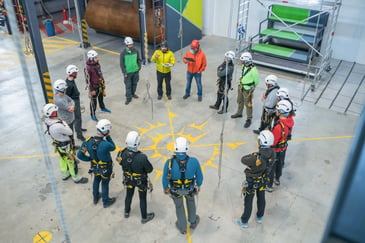The provision of recruitment and assessment services is increasingly being influenced by innovations in technology. While these innovations can have a positive impact on efficiency, care needs to be taken to ensure that the most important person in the process, the candidate, is appropriately considered and cared for - PeopleSense by Altius Organisational Psychologist, Grant Meyer explains
Factors Required for a Great Candidate Experience During Recruitment
Through our assessment experience and collaborative research with Shaker Assessments International, we have found that there are seven key factors to consider to ensure a positive experience for candidates during the selection process and these can be divided into two categories: those that address the process, and those that affect the experience.
Process factors include the ease of use, length of the process, setting realistic expectations for what the process will be like and communication from the hiring organisation. Experience factors include candidate engagement, how informative the application process is, and a meaningful opportunity for the candidate to demonstrate their skills.
Although Artificial Intelligence (AI) Supports These Factors – Barriers do Exist
While AI has the power to create assessments to support these factors, so far, few employers have used this potential to their advantage. To date, there is little evidence that first generation AI tools are improving the candidate experience and fears have been raised about legal, ethical and privacy issues. For example, is it appropriate for AI to analyse a candidate’s social media account to predict their suitability for a job based on inferred personality characteristics? Is it appropriate for information a candidate expected to be private, to be used to evaluate them for a position without consent? Our position at PeopleSense by Altius, is that it is only appropriate to use data that the applicant expressly approves or provides, such as assessment and interview responses.
How Then, is AI in Recruitment Better for Candidates?
Given the concerns about privacy and the focus on corporate efficiencies, does the advent of AI in recruitment doom the candidate process to be a soulless, cold, and dehumanising examination? Not at all, AI can and will lead to a host of exciting improvements in the candidate experience including:
- Bias Control
Early applications of AI for recruitment actually created bias by targeting specific outcomes (e.g. job performance) while ignoring others (e.g. diversity). By targeting all relevant outcomes, AI can help us ensure optimal, fair and legally defensible results on all fronts. - Real-Time Candidate Feedback
The best candidate experiences do not simply collect information, they give something back to the candidate. AI is uniquely suited to providing real-time feedback to candidates on their status in the application process as well as their fit with the role or the organisation. - Process Consolidation and Shortening
Traditional recruitment processes are composed of discrete steps (e.g. background checks, resume screens, assessments, interviews) and many of the steps collect redundant information. Combining data across steps allows for the elimination of redundancies, shortening of process length, and an overall better candidate experience. - Better Job Fit and Satisfaction
AI capabilities, such as deep learning, are superior to traditional analytic techniques at identifying the predictive relationships between tools like assessments and resumes, and job outcomes such as performance, likelihood of turnover, and ultimately job fit. Better job fit not only benefits the employer, it also provides a better outcome for the new hire. - Fewer Multiple-Choice Questions
One of the primary ways deep learning can improve assessments is by scoring unstructured content – open ended responses such as free form typing, speaking, or video. Before modern AI recruitment, pulling significant predictive information out of unstructured responses was not possible. As a result, the field of psychometrics resorted to simple, easy-to-score multiple-choice or similar such questions. Open-ended responses provide the candidate with the opportunity to respond more naturally and in their own words, giving an organisation a better view of their skills and abilities while providing the candidate with a more authentic and satisfying experience.
The Future of An Enhanced Candidate Experience is Here
Overwhelmingly, candidates prefer an experience that feels more like how they interact with technology at work and in their personal lives: fewer multiple-choice selections, more open-ended questions, typed responses, more chances to respond genuinely and to offer information about who they really are. This implies that it is less to do with whether a candidate meets the minimum requirements for the position and more to do with how their past work experience and skills sets will prepare them for a particular role.
A realistic assessment experience, coupled with predictive accuracy, will result in a better candidate experience for prospective applicants and a better quality hire for the organisation. Deployed with care and intent, human-centred AI use for recruitment can truly make the hiring experience better than ever for the candidate, not just the company.
Grant Meyer is a Principal Consultant within the PeopleSense by Altius Organisational Psychology team. The team offers best in class solutions to optimise the selection, engagement, development and performance of employees – while strengthening organisational culture and climate.






